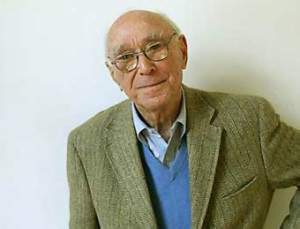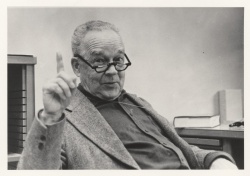 Jerome Bruner died recently at age 100. He was one of the first cognitive psychologists. His 1956 book, “A Study in Thinking” (co-authored with two other ground-breaking psychologists, Jacqueline Goodnow and George Austin), was the first shot fired in the cognitive revolution that finally overturned behaviorism. It demonstrated that minds could be studied scientifically. Others had done that before, people such as Fechner and Ebbinghaus in the 1800’s, but for some reason it was the Bruner, et al. book that made the splash. Right place at the right time, no doubt. You can’t fight history.
Jerome Bruner died recently at age 100. He was one of the first cognitive psychologists. His 1956 book, “A Study in Thinking” (co-authored with two other ground-breaking psychologists, Jacqueline Goodnow and George Austin), was the first shot fired in the cognitive revolution that finally overturned behaviorism. It demonstrated that minds could be studied scientifically. Others had done that before, people such as Fechner and Ebbinghaus in the 1800’s, but for some reason it was the Bruner, et al. book that made the splash. Right place at the right time, no doubt. You can’t fight history.
![Stimulus_2_materials[1]](http://billadamsphd.net/wp-content/uploads/2016/06/Stimulus_2_materials1-300x225.jpg) The Bruner book was on “concept formation,” something that a mind does, not the behaviorists’ muscle-twitches. Volunteers viewed complex geometric displays on cards, for example a yellow circle containing a single digit, enclosed in a green triangle. They were told if that item was a member of the target class or not. After viewing a series of such samples, the volunteer had to describe the target class, what it included and excluded. It could be, for example, even numbers inside squares. In order to form the correct concept, the volunteer would have to infer what all the positive examples had in common, and that the “wrong” samples lacked.
The Bruner book was on “concept formation,” something that a mind does, not the behaviorists’ muscle-twitches. Volunteers viewed complex geometric displays on cards, for example a yellow circle containing a single digit, enclosed in a green triangle. They were told if that item was a member of the target class or not. After viewing a series of such samples, the volunteer had to describe the target class, what it included and excluded. It could be, for example, even numbers inside squares. In order to form the correct concept, the volunteer would have to infer what all the positive examples had in common, and that the “wrong” samples lacked.
The brilliance of the demonstration was not to show that college students are good guessers when it comes to abstract materials. The innovation was that the entire demonstration was empirical. Concept formation, a purely mental task, was demonstrated by strictly controlled scientific methods. Ergo, the mind could be studied scientifically.
It seems silly now, but at the time, this was a revelation to me. As a young undergraduate in psychology I had been inculcated with behaviorism. Even in clinical observations, to report that a patient had been crying was cause for scorn. Instead, you had to say that the patient demonstrated “crying behavior” such as tears and sobs. What was behind those behavioral manifestations, if anything, could not be known or discussed scientifically, so don’t even mention them. Just report what you see. That was the rule. Talk about the tyranny of concepts!
Then one quarter I took an upper-level class at the University of Washington, where one of the assigned books was “A Study of Thinking,” and windows opened. Here was proof that you could study the mind scientifically. I was enthusiastic and read everything I could find by Bruner and his colleagues.
Just a few years later, I designed my Master’s thesis around Bruner’s methodology. I set up a concept formation task with similar materials and had volunteers learn to find the unifying rule from examples. I also gave volunteers a battery of personality tests, because my hypothesis was that there was some personality factor that made some people much better problem-solvers when it came to inferential tasks like that.
In the end, I could not identify such a personality trait but my methodology and reasoning were flawless and I earned the Master of Science degree. That’s what that degree means: you have demonstrated mastery of the concepts and techniques of your chosen field.
My doctoral work was also in cognitive psychology, where I studied human memory and perception, but not using Bruner’s concept formation paradigm. I had moved on and so had the field. (For the doctorate, you actually have to discover something — a much higher bar!)
 In my post-doctoral research year, studying with psychologists James and Eleanor Gibson at Cornell, Bruner’s name came up often. They disliked him and everything he stood for. Professional rivalry is the norm, but both Gibsons often disparaged Bruner in front of students. Why would you do that? That’s beyond friendly competition.
In my post-doctoral research year, studying with psychologists James and Eleanor Gibson at Cornell, Bruner’s name came up often. They disliked him and everything he stood for. Professional rivalry is the norm, but both Gibsons often disparaged Bruner in front of students. Why would you do that? That’s beyond friendly competition.
J.J. Gibson (his middle name was Jerome, same as Bruner’s first name), my mentor, claimed to be a behaviorist, by which he meant a functionalist, since a purely behaviorist psychology was a self-contradiction and always had been untenable, though most behaviorists would never agree. (Orthodoxy always trumps reason, even in science, which is founded on reason). Gibson often criticized Bruner and his work for being “mentalistic.” For Gibson, whatever the mind was, it was unknowable and unspeakable and Bruner was full of horsefeathers for talking about it.
How did Gibson accommodate the fact that Bruner’s studies of concept formation were strictly scientific, completely observable and verifiable, not mentalistic at all? He would never deign to discuss methodological details of Bruner’s work. Rather, he proposed his own approach: that animals were behaviorally attuned to their environments, intimately so. In fact, animals “resonated” with their environments, which allowed them to directly “pick up” facts about the world they could use for adaptive behavior. There was no need for mentalistic concepts like concepts.
What did “pick up” mean, exactly? He could never say, exactly. It was supposed to be some form of behavioral learning, pure muscle adaptation. What’s the “concept” for catching a fly ball? There isn’t one. Your body knows how to do it. It has nothing to do with concepts.
What did Gibson mean that the animal “resonated” with its environment? Again, he never gave an exact definition but argued that the animal merely appreciates, in a behavioral way, the opportunities for performance that its environment affords. Banana simply “says” “eat me” and water “says” “drink me.” No cognitive mediation is necessary. A horse will not jump off a cliff, because it just “knows,” in a non-mental way, that thin air does not afford it locomotion. A pigeon sees the situation very differently.
The subjects of Gibson’s explanations were always “animals” never volunteers or people, as if to emphasize that while people (such as he!) might have great ideas, that was irrelevant to the behavioral explanations he put forth. When it came to perception, we were all merely animals.
J.J. Gibson affected my thinking for the next two decades, until I finally understood what he was saying and what he was not saying. He was right and he was wrong. He was wrong and mule-headed in his commitment to behavioral psychology, but he was a genius in showing that at least half of what we assumed required mental “cognitive processing” could be accounted for by pre-cognitive, sub-personal, non-linguistic, tacit accommodation to simple geometry and routine transactions with one’s environment.
I am who I am today because of J.J. Gibson. His insights (and sometimes my disagreement with them) shaped my thinking about creativity, the self, phenomenology, socialization, linguistics, modern art, and much else that he never even discussed. But Jerry Bruner and his study of the mind, that mysterious black box that Gibson and others struggled so hard to deny, was my first real teacher, and you never forget your first teacher.

I think you should definitely NOT call Bruner the Father of Cognitive Science…at least as we know it today. That person is unquestionably Descartes. Read his work. He is the author of “I think, therefore I am” as the essential observation that you can scientifically observe how you “think” (your brain works) and thereby resolve many of the mysteries of man. His impact was enormous on par with other great scientists. Bruner was not the Father of Cognitive Science any more than Einstein was the Father of Physics…although arguably Newton was.